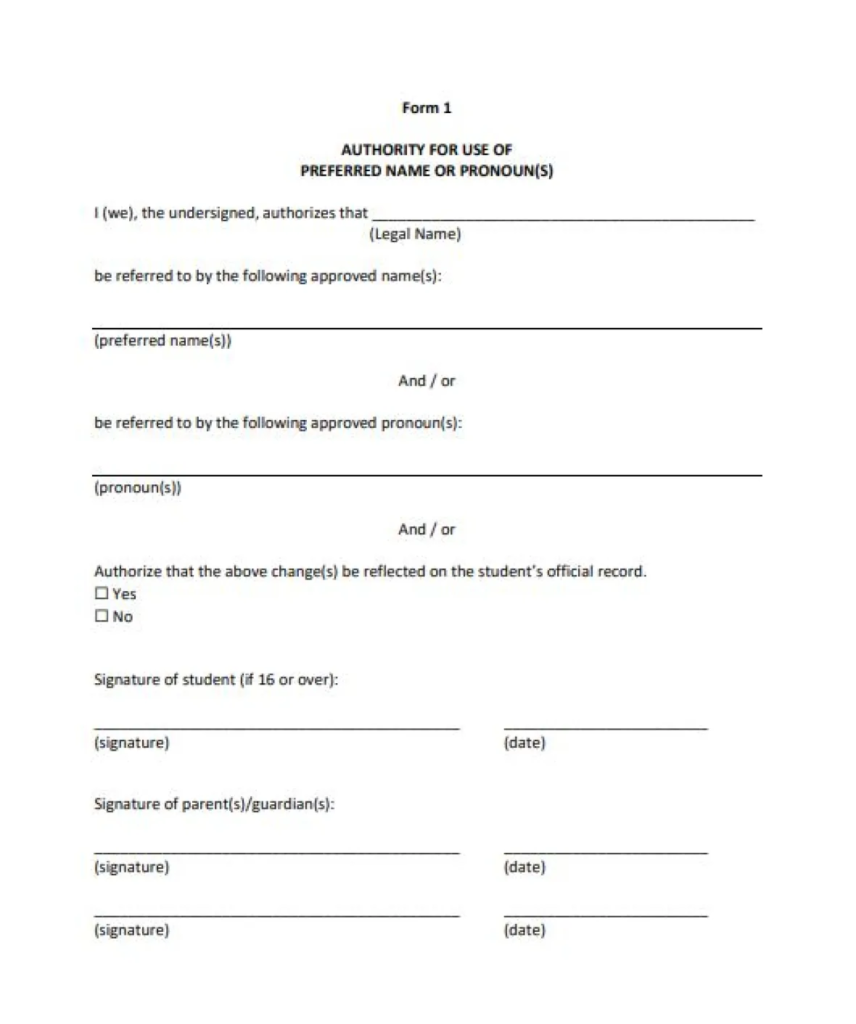As of this 2023/2024 school year, Saskatchewan schools have made a rule that requires students under 16 needing permission from their parent or guardian to change their name or pronouns at school. Consent is not required for students 16 or older. This is leaving teachers feeling uncomfortable and unable to protect their nonbinary or transgender students.
Up until this year, teachers could accept students when they would come and tell their teachers how they wanted to identify. Whether they wanted to be she/her, he/him, or they/them, it was up to them. Now there will be another hoop to jump through when making any changes. Teachers must have a signed consent form from a parent of students under 16 if they want to identify as any other pronouns or name than given at birth.

When asked why this policy is being enforced Saskatchewan Premier Scott Moe says “his claim that his government’s school pronoun policy was based on extensive consultations with parents, teachers and others, but a judge says there’s no evidence those occurred”. During conferences, Premier Scott Moe does not back down on his policy to enforce parental permission for students to change their names or pronouns.
This could have many different outcomes. There are a lot of situations where children under 16 won’t have the support system at home needed to let them live their truth. Some of these students may not have a safe space at home and so they come to school feeling relief that they can be who they want to be. Even though we are moving into a much more accepting world, there are still people who are stuck in their ways and won’t accept others for who they are.
Here is an example of what may happen. Imagine you are a teacher and you are teaching an eighth-grade class. A student comes up to you and asks for you to talk. The student expresses that they don’t identify with their given pronouns of she/her and they are non-binary and would like to use the pronouns they/them in the classroom. You would really like to let that student know that it won’t be a problem and thank them for telling you, but instead, you let the student know that you have to set up a meeting with their parents and have them give permission for this to happen. The student says that it is really important to them but their parents don’t agree with how they feel. This creates a super uncomfortable situation for both the student and you as the teacher. The student now doesn’t have a safe space where they can embrace who they are, and the teacher now has to address a student in a way that they don’t feel comfortable with and know that they are uncomfortable with it. This student will now struggle with this until they are 16 and can make the decision without permission from parents.
For some students, this could be an indifferent experience because they have an accepting support system behind them. Although it may be tough for anyone to express how they really feel, it is a lot easier when you are accepted no matter what. If the students who experience an unsupportive reaction hear from the students that experience a supportive reaction it may cause a divide between students that should be there supporting each other. The students who are not supported at home may feel resentment towards other students and that may cause more issues on top of the already present ones. So even though there will be positive experiences, there will most likely be more negative experiences.
Students are going to have a much harder time figuring themselves out and exploring their own identities. They have very little room to experiment and question. These kids will start to venture outside of their homes and schools and try to find safe places to be themselves in other areas. These other areas may not end up being as safe as they think it is. They will start being around older people who have the same experiences but these people might just be too mature for these young kids who are looking for people to confide in. These children can easily be taken down a bad path in this situation. This can cause lifelong implications that could have been avoided if there were safe spaces provided in their everyday lives as a child.
Hopefully, the Saskatchewan government will realize the negative impact that this will have on the younger generation. This may have effects on what they are willing and able to do for the economy in the future. Having an accepting and encouraging community to support our youth will help this generation be the best they can be and live up to their potential, while also being themselves.